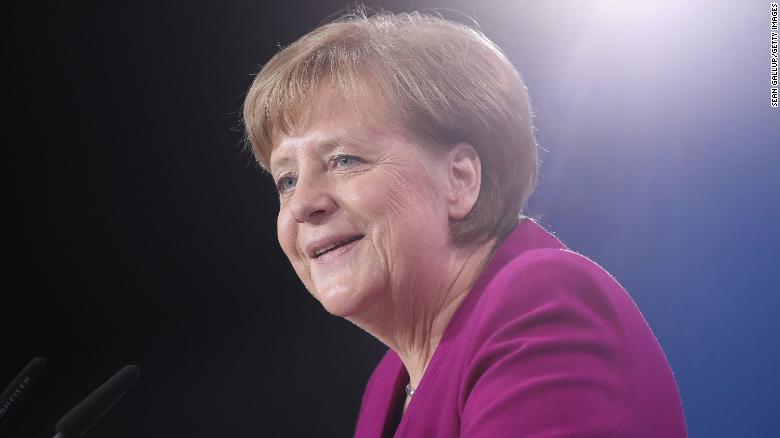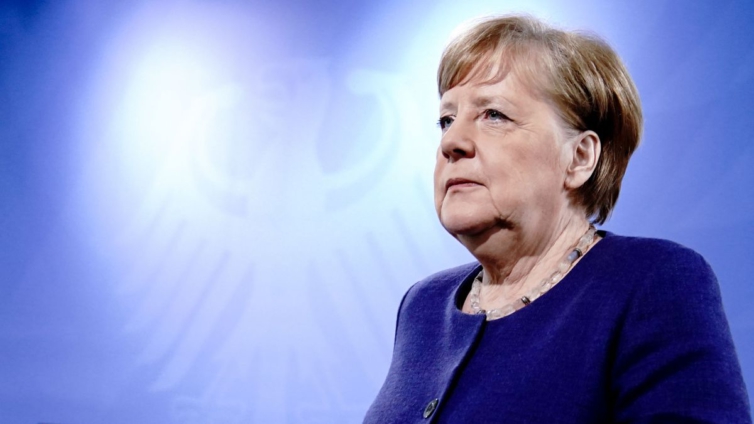Angela Merkel has been in the top job for nearly 16 years, but the biggest challenge of her career might still lie ahead.
The German Chancellor is racing against the clock to defeat the coronavirus before stepping down in September. She has a lot going against her.
Germany is struggling to contain the latest wave of the pandemic. The surge in infections is driven by the new, more contagious variant of the virus that was first identified in the United Kingdom, and which became dominant in Germany in early March.
The influential German Interdisciplinary Association for Intensive Care and Emergency Medicine has warned that the majority of the country's intensive care units are running at or close to full capacity.
On Monday, the number of Germans lost to the virus surpassed 80,000.
And so while the UK pushes ahead with its reopening plan and the US looks forward to a summer of freedom, Germany is facing yet another hard lockdown -- and the Germans are asking how it all went so wrong.
Kai Arzheimer, a political science professor at the University of Mainz, said the country has become a victim of its own success.
"Germany's initial response was decisive, successful, and informed by science," he told CNN.
The country -- and Merkel in particular -- was praised for the way it handled the first wave of the pandemic. As the virus steamrolled through Europe, Germany kept the epidemic under control. Its hospitals were even able to take in Covid-19 patients from neighboring France.
"This early success led to a certain complacency," Arzheimer said. "Politicians were very reluctant to re-introduce lockdown measures."
Merkel has struggled against this reluctance, her data-driven approach clashing with the political realities on the ground. She has repeatedly failed to convince the leaders of Germany's 16 federal states that more restrictions are necessary to contain the epidemic.
While Merkel heads the federal government, it is the state premiers who are responsible for the implementation of lockdown measures.
The most embarrassing moment for Merkel came in late March, when she was forced to make a complete U-turn on a strict lockdown she wanted to impose on the country over the Easter holiday.
She said the lockdown was necessary because of the rapid spread of the new strains of the virus. A day later and after much criticism, she reversed the decision saying it was not possible to implement it. She asked the nation for forgiveness and said the confusion was "singularly and alone my mistake."
"Chancellor Merkel is a natural scientist and she knows that scientists only know what they know in that moment, they can say 'at the moment, we can say that one and one are two, but we don't know whether one and one will be two tomorrow too, so we need to be cautious,'" said Gero Neugebauer, political scientist at Berlin's Free University.
"So at the national level, she gives a direction to the states and to the population, and says, we will do this and that, but we rely on the results of the scientific process."
Neugebauer said this approach was not replicated on the state level, where politicians felt more compelled to satisfy the expectations of the people.
Crucially, many of the regional leaders have faced or still are facing elections -- and they are acutely aware of the fact that after a year of living through a pandemic, voters do not want more restrictions.
"People became tired of it and the politicians know it," said Wolfgang Merkel (no relation to the Chancellor), professor of political science at Berlin's Humboldt University.
"They did not try to implement measures proposed by scientists and epidemiologists, because they were afraid they would exhaust the patience of the people."
Two states, Baden-Württemberg and Rhineland-Palatinate, held their regional polls in March. Merkel's party suffered major losses in both. Four more states -- Mecklenburg-Vorpommern, Saxony-Anhalt, Thuringia and Berlin -- will hold regional elections in the next six months, with the federal election coming in September.
The resistance on the state level has left Merkel scrambling. The long-time Chancellor has always favored building consensus and leading from the middle, which didn't work this time.
"Germany's political system is decentralized and has many veto points, so after the initial uniform response, the reaction to the second wave was much more reluctant and frayed," Arzheimer said.
Faced with a growing crisis, Merkel last week introduced a new emergency law that gives the federal government more powers to impose restrictions.
Under the proposed law, which still needs to be approved by the parliament, nationwide lockdown measures would tighten automatically if the seven-day coronavirus incidence rate rises above 100 per 100,000 people.
Neugebauer said Merkel's mistake was to wait until now to come up with the change.
"This process could have been done in autumn last year. But instead, they talked about hospitals, about figures, they talked about people dying, but they didn't decide anything," he said.

German Chancellor Angela Merkel speaks to delegates of her political party, the Christian Democratic Union, in February 2018.
Asked for a comment on the criticism of the government's handling of the crisis, a German government spokesperson referred to Merkel's remarks in parliament on Friday, where she advocated for the law change.
"We must brake the third wave of the pandemic and end the rapid rise in the numbers of new cases. To achieve this at last, we will have to focus the forces of the federal, state and local governments and authorities better than we have done in the recent past," the Chancellor told the Bundestag.
"We cannot ignore the emergency calls, we cannot leave the doctors and nurses on their own, because they cannot defeat the virus on their own, even with the best medical skills and self-sacrificing efforts," she said.
Saving her legacy
Merkel has repeatedly told Germans that she is hoping that by the time she steps down in the fall, the worst will be behind them.
She has also promised everyone will be offered at least one shot of the Covid-19 vaccine by September, a pledge that has taken a major hit because of supply issues.
"If you ask me what went wrong, there was certainly a trigger, and it was the European Union's failure to effectively and quickly acquire vaccine ... this marked a turn in Germany, that's when politicians in Germany became nervous," said Wolfgang Merkel.
He said the EU is not alone in facing the blame. "Germany held the presidency of the Council of the European Union, they had representatives there, sitting in the Commission," he explained.
Merkel has previously acknowledged failings with the speed of the vaccine rollout, but said she still expects 50 million Germans will have received at least one dose of the vaccine by the end of June.
Whatever happens in the next five months will, to a large extend, determine Merkel's future legacy.
"Merkel's personal ratings are still relatively high, but obviously, the federal government's reputation has taken a hit, and trust in Germany's response to the pandemic has declined," Arzheimer said.
He added that a drawn-out health emergency is not how Merkel would want to end her term in office -- despite the fact that much of the blame lies with the state prime ministers.
As a four-term chancellor, Merkel is often compared to two other long-serving post-war leaders, Konrad Adenauer and Helmut Kohl. Wolfgang Merkel said the last two years have shown the weakness of the German system, which allows chancellors to serve unlimited number of terms.
"She would have looked much better in the history books had she not served the last term," he said, adding that history is repeating itself. " It's lost time ... we have seen this during the last two years of Konrad Adenauer and with Helmut Kohl, who governed 16 years as well, and the last two years he did not have the power to influence politics."
Neugebauer added that Merkel's future legacy is much less well defined than that of Adenauer or Kohl. The first was the "Western Integration" Chancellor who led Germany back into European power structures, the latter the "Reunification Chancellor."
"For Chancellor Merkel, it was said that she could become the 'European integration Chancellor' and then she was going to be the 'humanity Chancellor', when she said 'refugees are welcome' and now she has the opportunity to become the 'Chancellor who defeated the pandemic,'" Neugebauer said.
"The danger of course is that the pandemic will still be there after September," he added.
Latest Stories
-
CHAN 2024Q: Ghana’s Black Galaxies held by Nigeria in first-leg tie
56 minutes -
Dr Nduom hopeful defunct GN bank will be restored under Mahama administration
2 hours -
Bridget Bonnie celebrates NDC Victory, champions hope for women and youth
2 hours -
Shamima Muslim urges youth to lead Ghana’s renewal at 18Plus4NDC anniversary
3 hours -
Akufo-Addo condemns post-election violence, blames NDC
3 hours -
DAMC, Free Food Company, to distribute 10,000 packs of food to street kids
4 hours -
Kwame Boafo Akuffo: Court ruling on re-collation flawed
4 hours -
Samuel Yaw Adusei: The strategist behind NDC’s electoral security in Ashanti region
4 hours -
I’m confident posterity will judge my performance well – Akufo-Addo
5 hours -
Syria’s minorities seek security as country charts new future
5 hours -
Prof. Nana Aba Appiah Amfo re-appointed as Vice-Chancellor of the University of Ghana
5 hours -
German police probe market attack security and warnings
5 hours -
Grief and anger in Magdeburg after Christmas market attack
5 hours -
Baltasar Coin becomes first Ghanaian meme coin to hit DEX Screener at $100K market cap
6 hours -
EC blames re-collation of disputed results on widespread lawlessness by party supporters
6 hours

